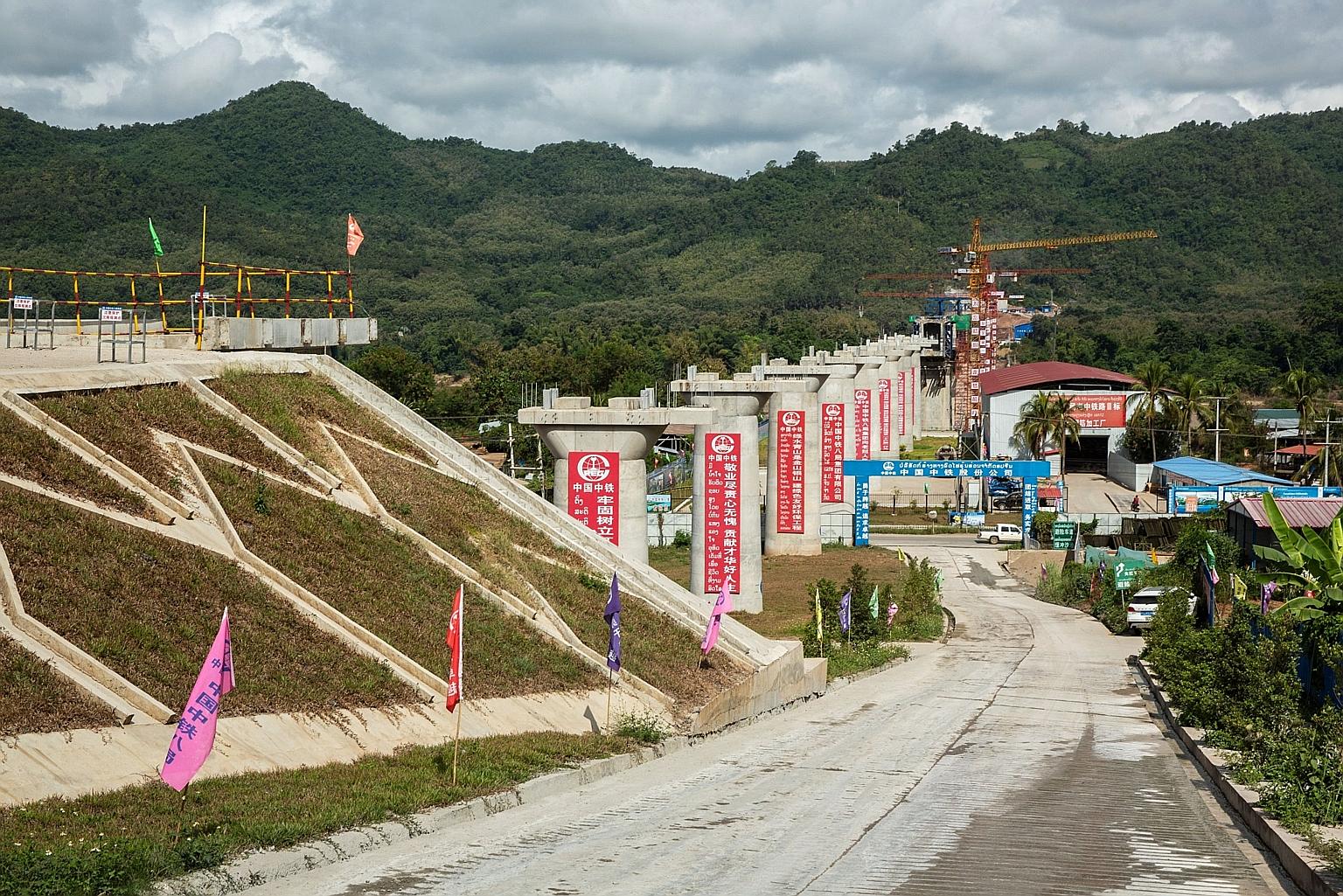Many not sold on Beijing's new stance on Belt and Road Initiative: Survey
Most in Asean study don't think their nation will benefit as distrust grows
Sign up now: Get insights on Asia's fast-moving developments

An October 2018 photo of Laos' Luang Prabang Railway under construction.
PHOTO: BLOOMBERG
China's recent pledge to make infrastructure projects in its Belt and Road Initiative (BRI) clean, green and financially sustainable has not convinced key influencers within the Asean region, according to the results of a survey released today by the ISEAS - Yusof Ishak Institute.
Distrust of the Asian power is growing despite widespread recognition that it has the biggest clout in the region.
According to The State Of South-east Asia: 2020, an online survey of 1,308 South-east Asian nationals in research, business, the public sector, civil society and media, 63.6 per cent of respondents have little or no confidence that Beijing's new approach to the BRI will give their respective countries a fairer deal.
Critics of the BRI, which aims to connect regional economies through a network of China-backed projects, allege that it is a debt trap that will make recipient countries beholden to a Beijing which is, at the same time, vigorously asserting its dominance against rival territorial claimants in the South China Sea.
The sense of distrust towards China was most palpable in Vietnam, the Philippines and Indonesia, noted authors Tang Siew Mun, Hoang Thi Ha, Anuthida Saelaow Qian, Glenn Ong and Pham Thi Phuong Thao from the think-tank's Asean Studies Centre.
Even in BRI recipient countries like Myanmar, Thailand, Cambodia, Malaysia and Laos, the majority of respondents remained sceptical.
In recent years, as the United States led by President Donald Trump backs away from multilateral institutions, Chinese President Xi Jinping has pledged to support and strengthen multilateral cooperation.
Yet, some 60 per cent of respondents had either "little confidence" or "no confidence" that China will "do the right thing" to contribute to global peace, security, prosperity and governance.
This level of distrust is an almost 10-percentage-point jump from last year, when the same question was posed to respondents.
Distrust heightened across all Asean member states except in Cambodia, one of China's closest allies in the 10-nation bloc.
Just over 52 per cent of respondents felt China was the most influential political and strategic power in South-east Asia, compared with 26.7 per cent for the US.
"While China can take gratification from the region's recognition of its growing political and strategic clout, it should do so with some grain of salt," noted the authors. "Among those who view China as having the most political-strategic influence in South-east Asia, 85.4 per cent registered their concern over this matter."
The authors added: "It bears reminding that recognising China's power is not the same as accepting the new reality. In fact, if not handled with due diligence, this may elicit counter-balancing forces to prevent China from becoming the region's hegemon."
Among respondents who hold a positive view of their countries' relations with Beijing, most see "China's growing economic dominance and political influence" in their respective country as the most important factor that could derail relations.
Their second-and third-biggest concerns were China's "strong-arm tactics in the South China Sea and the Mekong" and its use of "economic tools and tourism to punish their countries' foreign-policy choices".
As Asean member states hedge against uncertainty brought about by US-China rivalry, Japan and the European Union have stood out as the region's most preferred and strategic partners.
Some 61 per cent of respondents expressed confidence that Japan will "do the right thing" to provide global public goods.
The EU was ranked first by respondents for "maintaining the rules-based order and upholding international law".
Meanwhile, the survey found that Samsung was the overall telecommunications provider of choice to develop 5G networks in the region.
"Given its potential security ramifications, the award of the 5G contract can be seen as a vote of confidence and trust in the developer's country," the authors write.
Respondents were asked: "In which company/companies do you have the highest level of confidence to build your country's 5G Internet infrastructure network?"
Samsung, a South Korean conglomerate, emerged the top choice overall, with 38.5 per cent of votes.
Chinese companies such as Datang Telecom, Huawei and ZTE were the top choices in Laos, Cambodia and Malaysia.
In Singapore, the biggest group of respondents - 25.7 per cent - chose Samsung, followed by Ericsson of Sweden (22.5 per cent), and the Chinese providers (19.4 per cent).
Meanwhile, respondents regarded domestic political instability, the economic downturn and climate change as the top three concerns for South-east Asia's security.
Less than a quarter of the respondents think that their governments have allocated sufficient resources to address climate change, though most Singapore respondents did not share that downbeat sentiment.
Some 52 per cent of all respondents felt that their respective "government is aware of the threats but has not allocated sufficient resources to address them".
In contrast, 60.4 per cent of Singapore respondents agreed with the statement "My government considers climate change an urgent national priority and has allocated sufficient resources to address this threat".


